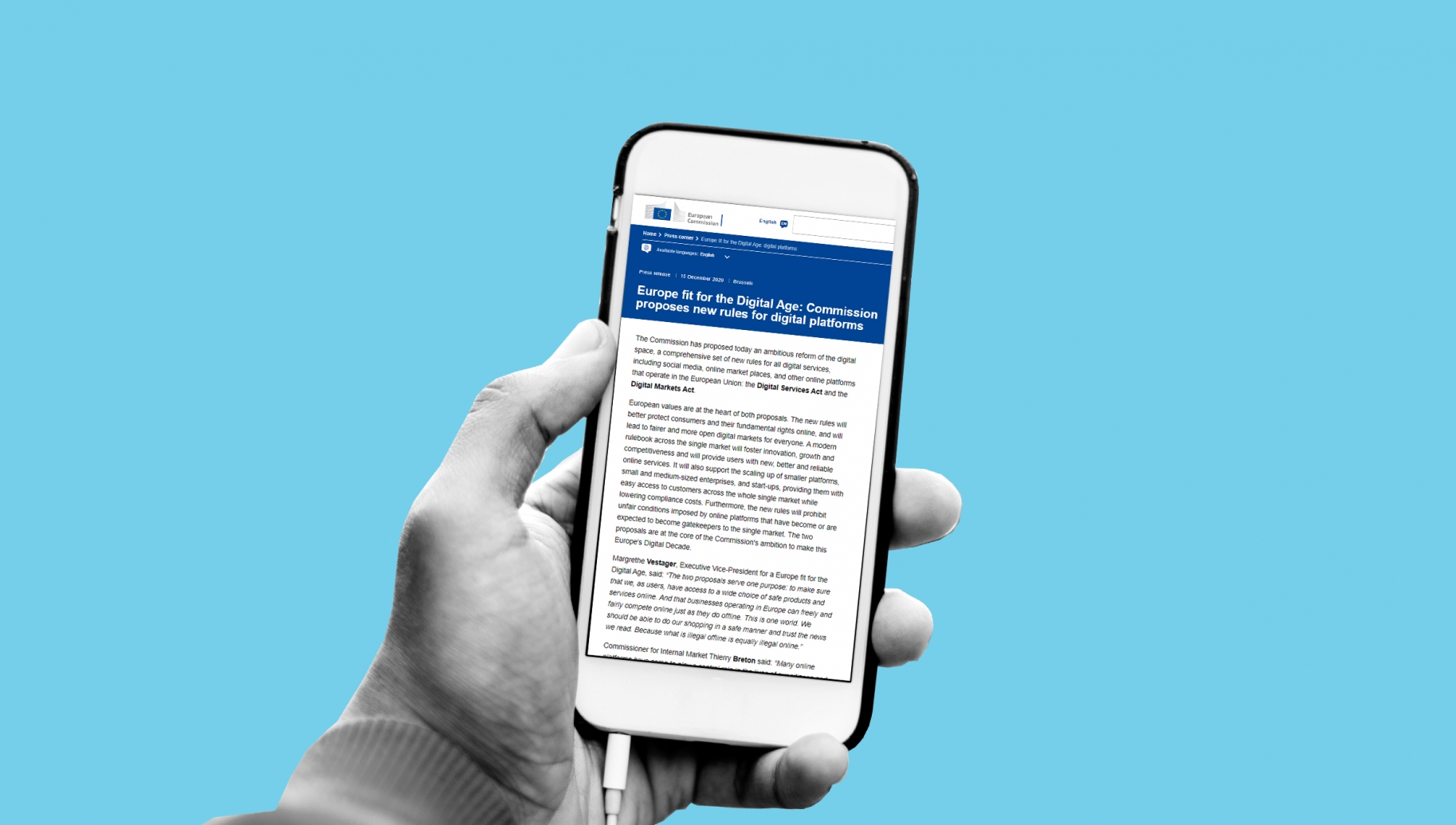We are living in a period of transformation that will permanently shape the digital operating environment. On 15 December 2020, the European Commission published two legislative proposals that are key milestones on the path to “Europe’s Digital Decade”. The new rules concerning the digital operating environment based on European values will better protect consumers and their fundamental rights online. They will lead to fairer and more open digital markets.
The proposed rules will support the growth of small platforms, small and medium-sized enterprises and start-ups. The new rules will prohibit unfair conditions imposed by online platforms that have become or are expected to become gatekeepers to the single market. Gatekeepers are companies that hold technology, know-how or standards with which they can control access to certain markets.
Digitisation can be managed based on values
In a European Commission press release, Margrethe Vestager, Executive Vice-President for a Europe fit for the Digital Age, summarised the goals of regulation: “The two proposals serve one purpose: to make sure that we, as users, have access to a wide choice of safe products and services online, and that businesses operating in Europe can freely and fairly compete online just as they do offline. This is one world. We should be able to do our shopping in a safe manner and trust the news we read. What is illegal offline is also illegal online.”
The Digital Markets Act, on the other hand, addresses the negative effects of platforms acting as digital “gatekeepers” to the single market. The legislation sets out harmonised rules defining and prohibiting such unfair practices by gatekeepers. Good trading practices are thereby expanded to apply to search engines, social networks and online intermediation services.
The new rule proposals are a follow-up to the previously published rule on European data governance and sharing.
At the Commission’s 15 December 2020 briefing, Commissioner for the Internal Market Thierry Breton emphasised that the EU has a favourable attitude towards all parties, including large ones. But he pointed out that the bigger the operators are the more responsibility they bear for their actions. “We are not against anyone, but for democracy, vitality of businesses, innovation and fair competition.”
In their joint presentation, the commissioners assured journalists that the initial political consensus will hold, despite rumoured conflicts and differences of opinion. The EU has an opportunity to be a values-based shaper of the new digital operating environment. The earlier General Data Protection Regulation General Data Protection Regulation (GDPR) Regulation (EU) 2016/679, the European Union’s ("EU") new General Data Protection Regulation ("GDPR"), regulates the processing by an individual, a company or an organisation of personal data relating to individuals in the EU. Open term page General Data Protection Regulation (GDPR) has already made the EU a trailblazer when it comes to personal data-related regulation.
Operating environment being reformed from several directions
There is a long way to go from proposed rules to their practical implementation. So, despite controversy and practical difficulties, we can be optimistic that we will witness the start of a new digital decade. The operating environment is now being shaped from several directions.
A few years ago, Germany and France launched the European Gaia-X collaboration project. This aims to create an open ecosystem that defines standards and infrastructure for sharing data based on European values. The industry-driven project is open to global technology giants, but underlying it is the pursuit of digital sovereignty and common ground rules by European companies.
Several studies and articles also discuss how corporate social responsibility has become a priority in corporate management and securing consumer confidence in digital services. This year, Gartner forecast that within four years 30% of companies will use a new tool that measures the “voice of society” and use it to try to shape their role in society. Corporate social responsibility should also extend to data, and this requires expanding the current frameworks and completely new thinking. Regulatory frameworks accelerate development, but pioneering companies act more responsibly and ethically when anticipating change than when mandated by legislation.
These are the signs of the digital operating environment will look different after 2020. Executive Vice-President Margrethe Vestager compared the new rules to traffic lights, which were adopted a century ago when cars appeared in traffic alongside horses. The digital infrastructure and data economy are also evolving at such a quick pace that it is necessary to create rules for them, treating the online and offline worlds in the same way. The comparison between data and roads is apt. In today’s society, data is a basic structure that needs to serve society extensively without monopolisation or being influenced by algorithms, and without algorithm-based systems creating disaffection or discriminatory practices.
For more details, see the European Commission’s press release (15 December 2020).

















Recommended
Have some more.